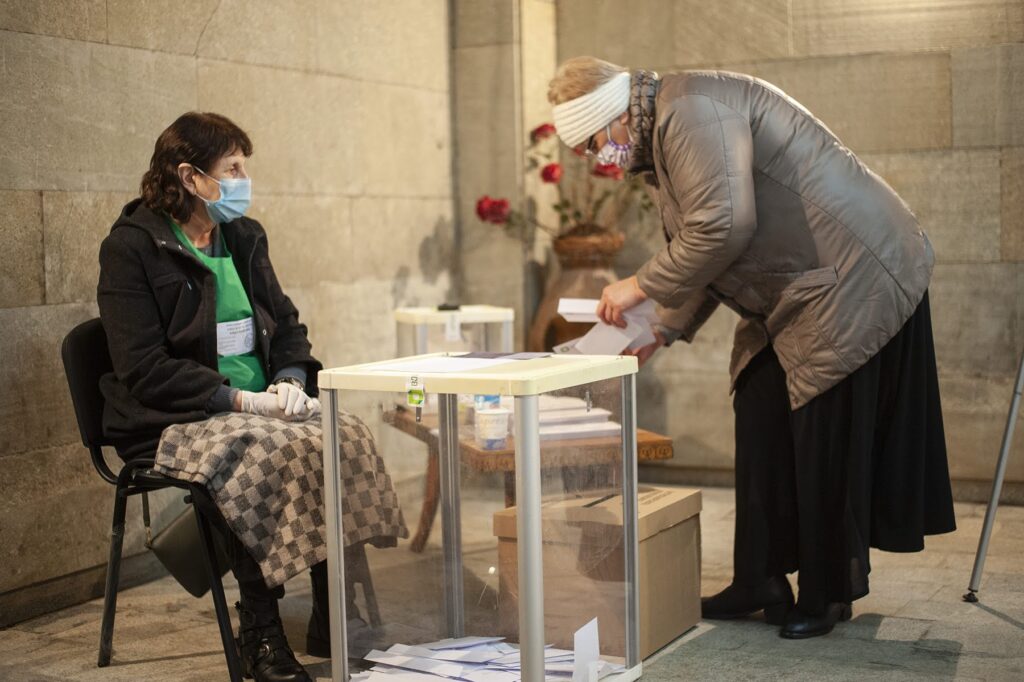Georgian election watchdog the International Society for Fair Elections And Democracy (ISFED) has found itself embroiled in scandal after admitting to making a mistake in their parallel vote tabulation.
Since 31 October’s parliamentary election, all eight opposition parties that won seats have denounced the vote as rigged, in part, though not only, because of irregularities raised by ISFED and other watchdogs.
The day after the elections, ISFED unveiled the results of their Parallel Vote Tabulation (PVT), which gave Georgian Dream 45.8% of the vote. The official result gave the ruling party 48.2%. On Friday, the group admitted to making an error in their PVT-based vote calculation by including invalid ballots.
In their post-election report on 1 November, ISFED also claimed that in 8% of polling stations the number of cast ballot papers exceeded the number of voter signatures, which they said could have affected the results by 4.1%.
On Monday, the ruling Georgian Dream party challenged the group to name all 8% of polling stations where they had reported that the cast ballot papers exceeded the voter signatures. The party’s executive secretary, Irakli Kobakhidze, demanded that ISFED come forward with the polling stations or apologise. He insisted that the actual discrepancy that ISFED had found did not amount to ‘even 1%’.
Kobakhidze, who ran Georgian Dream’s election campaign since September, said he hoped it would not take ISFED ‘three-four weeks’ to come forward with their data after they ‘carefully hid the PVT fraud’ for weeks.
Both Kobakhidze and ISFED’s Chair, Elene Nizharadze, confirmed they communicated over the last month as Georgian Dream sought to see documentation related to the PVT to check for inaccuracies.
As Kobakhidze reprimanded ISFED, his party fielded Giorgi Gakharia to parliament as their prime-ministerial candidate to form the new government. The parliament remains boycotted by all eight opposition groups.
[Read more on OC Media: Georgia’s new parliament opens without a single member of the opposition]
Illegal wiretapping ‘not ruled out’
On 11 December, 40 days after their initial statement, ISFED offered corrected PVT estimates giving seven out of nine political groups — including the opposition United National Movement-led (UNM) Strength in Unity coalition block, and Georgian Dream — higher numbers.
The changes raised Georgian Dream’s estimated support from 45.8% to 47.6%, narrowing the gap with official numbers.
Georgian Dream responded by claiming that allegations of electoral fraud from opposition groups was a ‘blatant lie’.
Many opposition supporters took to Facebook to attack ISFED over their 11 December admission, alleging the group had ‘sold out’ to Georgian Dream or was pressured by them to alter their initial report.
While opposition groups refrained from such theories, members from the UNM and European Georgia speculated that the government could have illegally accessed ISFED’s data.
Irakli Kobakhidze’s press conference on 14 December followed an admission by ISFED chair Elene Nizharadze two days earlier that the ‘mistake’ had damaged their reputation. She also ‘did not rule out’ the possibility of illegal monitoring from the authorities.
Georgian Dream has vigorously denied the allegation, insisting that they had only looked into the publicly available original PVT results that they said did not add up.
ISFED also insisted that their updated data did not change the distribution of seats after the 31 October election, which they reiterated was still held under the ‘lowest standard’ in recent years, referring again to ‘mismatches of 8% of the polling station protocols’.
In conversation with RFE/RL on 14 December, Nizharadze insisted they 'did not have anything to apologise for’.
Election violations
A number of opposition groups currently boycotting the new parliament, the UNM, European Georgia, and Girchi among them, have pointed out since 11 December that the PVT monitoring would not reflect the scope of violations during October election.
Speaking to TV channel Formula on 14 December, European Georgia’s Sergi Kapanadze argued that elections were ‘rigged’ mainly through ballot box stuffing, voter carousels, and voter intimidation, which PVT-based monitoring would not detect.
On 4 November, over 25 local rights groups including ISFED, the Georgian Young Lawyers’ Association, and Transparency International Georgia, called the 31 October vote ‘the least democratic and free among the elections held under the Georgian Dream government’.
Their joint statement identified scuffles outside the polling stations, harassment of voters and journalist, vote-buying, ‘unprecedented use’ of administrative resources, and breaches of voter secrecy among the recurring violations throughout 31 October.

Criticism both from watchdog groups and opposition parties grew even further after the Central Election Commission were later than usual in publishing the preliminary results of the 31 October vote, and for later rejecting most of the complaints related to imbalanced vote protocols.
These findings were reflected and mostly confirmed by the OSCE/ODIHR international observer mission.




 14 December 2020
14 December 2020



